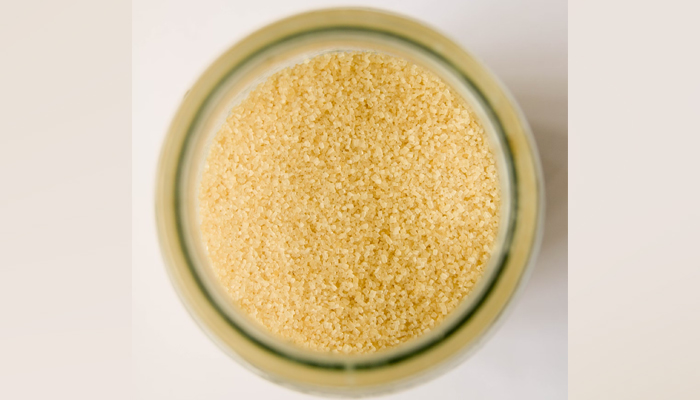Sugar millers seek to import raw sugar for export, eye $3 billion earnings
PSMA vice chairman commended minister's efforts to boost exports and govt's commitment to importing raw sugar
ISLAMABAD: Sugar millers have asked the government to allow them to import raw sugar and refine it for export, saying this could generate more than $3 billion in foreign exchange for the country.
The Pakistan Sugar Mills Association (PSMA) said in a letter to the interim commerce and industry minister Gohar Ejaz that importing raw sugar would help the sector run its mills year-round and significantly contribute to a substantial increase in sugar sector exports.
The PSMA vice chairman Iskander Khan commended the minister's efforts to boost exports and the government's commitment to importing raw sugar. Khan said the initiative was expected to to a substantial increase in sugar sector exports, projecting an earnings potential of over $3 billion. The current annual ethanol exports stand at over $500 million.
Sources confirmed to The News that the Sugar Advisory Board (SAB), a tripartite body comprising representatives from the federal and provincial governments and the sugar industry, convened on November 22 with minister Ejaz in the chair to consider a request from sugar millers to export 500,000 tons of refined sugar.
Although the request was turned down, Ejaz suggested importing raw sugar to run the mills throughout the year, refine it, and earn foreign exchange and profit. The sugar industry, operating on a three-month crushing season with a subsequent nine-month closure period, faces escalating fixed charges, contributing to the overall cost of sugar.
In the letter, Khan noted, “Prior to your [Gohar Ejaz] valuable comments on the import of raw sugar, we had been denied permission to import raw sugar for refining to earn foreign exchange and ensure the continuation of employment, which is currently only available during the crushing season.”
The sugar industry heavily relies on domestic value addition from sugarcane, making annual payments to farmers exceeding Rs600 billion, contributing Rs590 billion to the GDP, and generating tax revenues surpassing Rs100 billion. Additionally, due to its location, the sugar industry plays a pivotal role in generating employment in rural areas.
Despite these contributions, the sugar industry faces challenges in exercising its constitutionally guaranteed freedom of trade. Arbitrary measures to control the sugar crisis disproportionately benefit 80 percent of industrial consumers, leaving 20 percent of domestic consumers at a disadvantage.
The industry advocates for a shift towards providing tax-free sugar through utility stores to underprivileged citizens, rather than persistent crackdowns that disrupt the market mechanism determining sugar prices.
-
 Man Convicted After DNA Links Him To 20-year-old Rape Case
Man Convicted After DNA Links Him To 20-year-old Rape Case -
 Royal Expert Shares Update In Kate Middleton's Relationship With Princess Eugenie, Beatrice
Royal Expert Shares Update In Kate Middleton's Relationship With Princess Eugenie, Beatrice -
 Andrew Mountbatten-Windsor’s Leaves King Charles With No Choice: ‘Its’ Not Business As Usual’
Andrew Mountbatten-Windsor’s Leaves King Charles With No Choice: ‘Its’ Not Business As Usual’ -
 Dua Lipa Wishes Her 'always And Forever' Callum Turner Happy Birthday
Dua Lipa Wishes Her 'always And Forever' Callum Turner Happy Birthday -
 Police Dressed As Money Heist, Captain America Raid Mobile Theft At Carnival
Police Dressed As Money Heist, Captain America Raid Mobile Theft At Carnival -
 Winter Olympics 2026: Top Contenders Poised To Win Gold In Women’s Figure Skating
Winter Olympics 2026: Top Contenders Poised To Win Gold In Women’s Figure Skating -
 Inside The Moment King Charles Put Prince William In His Place For Speaking Against Andrew
Inside The Moment King Charles Put Prince William In His Place For Speaking Against Andrew -
 Will AI Take Your Job After Graduation? Here’s What Research Really Says
Will AI Take Your Job After Graduation? Here’s What Research Really Says -
 California Cop Accused Of Using Bogus 911 Calls To Reach Ex-partner
California Cop Accused Of Using Bogus 911 Calls To Reach Ex-partner -
 AI Film School Trains Hollywood's Next Generation Of Filmmakers
AI Film School Trains Hollywood's Next Generation Of Filmmakers -
 Royal Expert Claims Meghan Markle Is 'running Out Of Friends'
Royal Expert Claims Meghan Markle Is 'running Out Of Friends' -
 Bruno Mars' Valentine's Day Surprise Labelled 'classy Promo Move'
Bruno Mars' Valentine's Day Surprise Labelled 'classy Promo Move' -
 Ed Sheeran Shares His Trick Of Turning Bad Memories Into Happy Ones
Ed Sheeran Shares His Trick Of Turning Bad Memories Into Happy Ones -
 Teyana Taylor Reflects On Her Friendship With Julia Roberts
Teyana Taylor Reflects On Her Friendship With Julia Roberts -
 Bright Green Comet C/2024 E1 Nears Closest Approach Before Leaving Solar System
Bright Green Comet C/2024 E1 Nears Closest Approach Before Leaving Solar System -
 Meghan Markle Warns Prince Harry As Royal Family Lands In 'biggest Crises' Since Death Of Princess Diana
Meghan Markle Warns Prince Harry As Royal Family Lands In 'biggest Crises' Since Death Of Princess Diana




